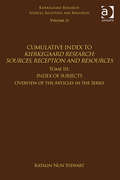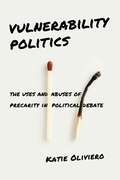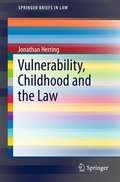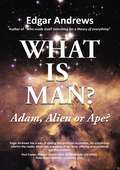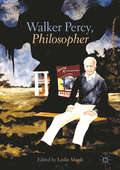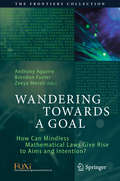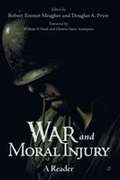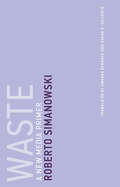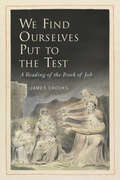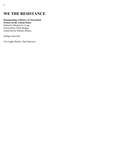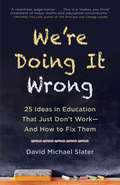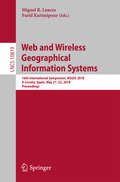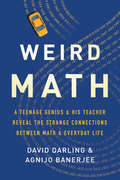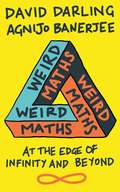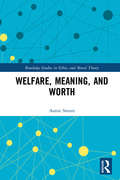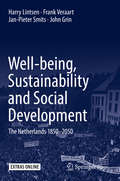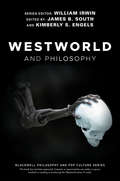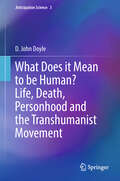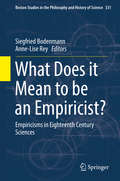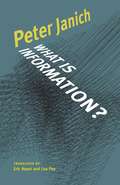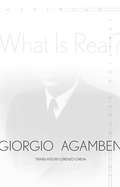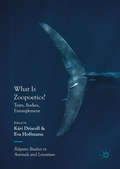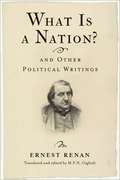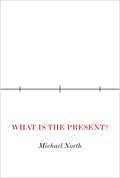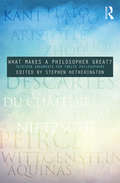- Table View
- List View
Volume 21, Tome III: Index of Subjects, Overview of the Articles in the Series (Kierkegaard Research: Sources, Reception and Resources)
by Katalin Nun StewartThis last volume of Kierkegaard Research: Sources, Reception and Resources is a cumulative index to all the volumes of the series. The series was originally designed in a systematic fashion in order to make it as easily usable and accessible as possible. The individual parts of the series and the individual volumes have been organized to make it generally fairly simple to locate the main articles relevant for one’s research interests. However, the placement of some individual articles might not always be completely self-evident. Moreover, the sheer mass of material and information provided by the series makes a cumulative index a necessary accompanying resource. Further, given the scope of the series, it was inevitable that some names or topics are mentioned more than once in the series in different places beyond the main article ostensibly dedicated to them. The purpose of these indices is thus to help the readers to find an easy and direct way to the topics of their interest in the rich universe of Kierkegaard research. The material of the indices is divided into three tomes: Tome I is the Index of Names from A to K, Tome II covers the Index of Names from L to Z, while Tome III consists of the Index of Subjects and includes a complete overview of all the volumes, tomes and articles of the series.
Vulnerability Politics: The Uses and Abuses of Precarity in Political Debate
by Katie OlivieroA new understanding of vulnerability in contemporary political cultureProgressive thinkers have argued that placing the concept of vulnerability at the center of discussions about social justice would lead governments to more equitably distribute resources and create opportunities for precarious groups – especially women, children, people of color, queers, immigrants and the poor. At the same time, conservatives claim that their values and communities are vulnerable to attack–often by these same groups. In turn, they craft antidemocratic representations of vulnerability that significantly influence the political landscape, restricting human and legal rights for many in order to expand them for a historically privileged few.Vulnerability Politics examines how twenty-first century political struggles over immigration, LGBTQ rights, reproductive justice, and police violence have created a sense of vulnerability that has an impact on culture and the law. By researching organizations like the Minutemen (civilians who monitor the US/Mexico border), the Protect Marriage Coalition (a campaign to ban same-sex marriage in California), and the Center for Bio-Ethical Reform (an anti-abortion movement), Katie Oliviero shows how conservative movements use the rhetoric of risk to oppose liberal policies by claiming that the nation, family, and morality are imperiled and in need of government protection.The author argues that this sensationalism has shifted the focus away from the everyday and institutional precarities experienced by marginalized communities and instead reinforces the idea that groups only deserve social justice protections when their beliefs reflect the dominant nationalist, racial, and sexual ideals.
Vulnerability, Childhood and the Law (SpringerBriefs in Law)
by Jonathan HerringThis book will challenge the orthodox view that children cannot have the same rights as adults because they are particularly vulnerable. It will argue that we should treat adults and children in the same way as the child liberationists claim. However, the basis of that claim is not that children are more competent than we traditionally given them credit for, but rather that adults are far less competent than we give them credit for. It is commonly assumed that children are more vulnerable. That is why we need to have a special legal regime for children. Children cannot have all the same rights as adults and need especial protect from harms. While in the 1970s “child liberationists” mounted a sustained challenge to this image, arguing that childhood was a form of slavery and that the assumption that children lacked capacity was unsustainable. This movement has significantly fallen out of favour, particularly given increasing awareness of child abuse and the multiple ways that children can be harmed at the hands of adults. This book will explore the concept of vulnerability, the way it used to undermine the interests of children and our assumptions that adults are not vulnerable in the same way that children are. It will argue that a law based around mutual vulnerability can provide an approach which avoids the need to distinguish adults and children.
WHAT IS MAN?: Adam, Alien or Ape?
by Edgar AndrewsIn 1906, American humorist Mark Twain published a sixty-page essay entitled “What is man?” Consisting of an interminable dialogue between a senior citizen (who believes that man is just a machine) and a young man (who believes nothing in particular but is open to persuasion), it wasn’t one of his finest books. But at least he tried. Authors since then seem to have avoided the subject like the plague, often tackling the respective roles of men and women in society but seldom asking deeper questions about what it means to be human. When the psalmist asked, “What is man?” (Psalm 8 v.4) he was, I think, seeking an altogether more profound answer.Avoidance of the subject is all the more strange because there has never been a time like our own when curiosity about human origins and destiny has been greater, or the answers on offer more hotly disputed. It’s a safe bet that any attempt to give the “big picture” on the origin, nature and specialness of mankind will be contentious —which might explain why writers have generally fought shy of it. Yet at heart it is the question most of us really do want answered, because the answer defines that precious thing we call our identity, both personally and as a race.The Psalmist did, of course, offer his own answer three millennia ago. Man, he claimed, was created by God for a clearly defined purpose — to exercise dominion over planet earth and (by implication) to ultimately share something of the glory of the divine nature. The rest, as they say, is history, but it’s not a happy tale. As Mark Twain says in another essay; “I can’t help being disappointed with Adam and Eve”. Not surprisingly, then, a large proportion of humanity today are looking for alternative solutions, accepting the challenge of the Psalmist’s question without embracing the optimism of his answer.In this book we are going to consider the alternative solutions on offer by considering what it means to be human against the backgrounds of cosmology (man’s place in the universe), biology (man’s place in the animal kingdom), and psychology (man’s consciousness and mind). Finally, we return to the biblical context, arguing that the Psalmist got it right after all.Don’t let the science-sounding stuff put you off. Like its popular prequel, “Who made God? Searching for a theory of everything”, this book is written with a light touch in a reader-friendly and often humorous style. It is intended specifically for the non-expert, with homely verbal illustrations designed to explain and unpack the technicalities for the lay-person. As Dr. Paul Copan (Pledger Family Chair of Philosophy and Ethics, Palm Beach Atlantic University) says, "Edgar Andrews has a way of making the profound accessible. His scholarship informs the reader about key questions of our time, offering wise guidance and illumination."
Walker Percy, Philosopher
by Leslie MarshThough Walker Percy is best known as a novelist, he was first and foremost a philosopher. This collection offers a sustained examination of key aspects to his more technical philosophy (primarily semiotics and the philosophy of language) as well as some of his lesser known philosophical interests, including the philosophy of place and dislocation. Contributors expound upon Percy’s multifaceted philosophy, an invitation to literature and theology scholars as well as to philosophers who may not be familiar with the philosophical underpinnings of his work.
Wandering Towards a Goal: How Can Mindless Mathematical Laws Give Rise To Aims And Intention? (The Frontiers Collection)
by Anthony Aguirre Brendan Foster Zeeya MeraliThis collection of prize-winning essays addresses the controversial question of how meaning and goals can emerge in a physical world governed by mathematical laws. What are the prerequisites for a system to have goals? What makes a physical process into a signal? Does eliminating the homunculus solve the problem? The three first-prize winners, Larissa Albantakis, Carlo Rovelli and Jochen Szangolies tackle exactly these challenges, while many other aspects (agency, the role of the observer, causality versus teleology, ghosts in the machine etc.) feature in the other award winning contributions. All contributions are accessible to non-specialists.These seventeen stimulating and often entertaining essays are enhanced versions of the prize-winning entries to the FQXi essay competition in 2017.The Foundational Questions Institute, FQXi, catalyzes, supports, and disseminates research on questions at the foundations of physics and cosmology, particularly new frontiers and innovative ideas integral to a deep understanding of reality, but unlikely to be supported by conventional funding sources.
War and Moral Injury: A Reader
by Robert Emmet Meagher Douglas A. PryerMoral Injury has been called the "signature wound" of today's wars. It is also as old as the human record of war, as evidenced in the ancient war epics of Greece, India, and the Middle East. But what exactly is Moral Injury? What are its causes and consequences? What can we do to prevent or limit its occurrence among those we send to war? And, above all, what can we do to help heal afflicted warriors? This landmark volume provides an invaluable resource for those looking for answers to these questions. Gathered here are some of the most far-ranging, authoritative, and accessible writings to date on the topic of Moral Injury. Contributors come from the fields of psychology, theology, philosophy, psychiatry, law, journalism, neuropsychiatry, classics, poetry, and, of course, the profession of arms. Their voices find common cause in informing the growing, international conversation on war and war's deepest and most enduring invisible wound. Few may want to have this myth-challenging, truth-telling conversation, but it is one we must have if we truly wish to help those we send to fight our wars.
Waste: A New Media Primer (Untimely Meditations #13)
by Roberto SimanowskiOn Facebook and fake news, selfies and self-consciousness, selling our souls to the Internet, and other aspects of the digital revolution. With these engaging and provocative essays, Roberto Simanowski considers what new media has done to us. Why is digital privacy being eroded and why does society seem not to care? Why do we escape from living and loving the present into capturing, sharing and liking it? And how did we arrive at a selfie society without self-consciousness?Simanowski, who has been studying the Internet and social media since the 1990s, goes deeper than the conventional wisdom. For example, on the question of Facebook's responsibility for the election of Donald Trump, he argues that the problem is not the “fake news” but the creation of conditions that make people susceptible to fake news. The hallmark of the Internet is its instantaneousness, but, Simanowski cautions, speed is the enemy of depth. On social media, he says, “complex arguments are jettisoned in favor of simple slogans, text in favor of images, laborious explorations at understanding the world and the self in favor of amusing banalities, deep engagement in favor of the click.” Simanowski wonders if we have sold our soul to Silicon Valley, as Faust sold his to the Devil; credits Edward Snowden for making privacy a news story; looks back at 1984, 1984, and Apple's famous sledgehammer commercial; and considers the shitstorm, mapping waves of Internet indignation—including one shitstorm that somehow held Adidas responsible for the killing of dogs in Ukraine. “Whatever gets you through the night,” sang John Lennon in 1974. Now, Simanowski says, it's Facebook that gets us through the night; and we have yet to grasp the implications of this.
We Find Ourselves Put to the Test: A Reading of the Book of Job
by James CrooksDoes the world we inhabit offer us hospitality or indifference? This question is central to the spiritual literature of all cultures. In We Find Ourselves Put to the Test James Crooks returns to the Bible’s book of Job to explore the enduring relevance of that question and its philosophical dimensions. Beginning with the puzzle of Job’s famous stoicism and nihilism in the face of loss, Crooks explores the contradictions of suffering as dramatized in the dialogue between Job and his friends. How is it that the friends’ attempt to comfort Job with a rational explanation of his misfortune devolves seamlessly into victim blaming? How is it that Job’s own renunciation of life at the nadir of his pain converts into an intellectual patience that outlasts the advocates of rational explanation? We Find Ourselves Put to the Test gives a portrait of the suffering protagonist looking into the heart of a creation that is, by necessity, both indifferent and hospitable. A philosophical exploration of one of the most enigmatic books in the Bible, We Find Ourselves Put to the Test goes beyond critical interpretation and suggests a way of reading the book of Job that is animated by a consideration of the reader’s narratives and communities, and the limits of his or her own understanding.
We The Resistance: Documenting A History Of Nonviolent Protest In The United States
by Chris Hedges Michael G. Long Dolores Huerta"A highly relevant, inclusive collection of voices from the roots of resistance. . . . Empowering words to challenge, confront, and defy."--Kirkus Reviews "This book fights fascism. This books offers hope. We The Resistance is essential reading for those who wish to understand how popular movements built around nonviolence have changed the world and why they retain the power to do so again."—Jonathan Eig, author of Ali: A Life
We're Doing It Wrong: 25 Ideas in Education That Just Don't Work—And How to Fix Them
by David Michael SlaterAn unapologetic critique of major flaws in the American education system. David Michael Slater’s We’re Doing It Wrong is a thought-provoking dissection of the issues plaguing American public schools. Each chapter identifies a major problem in the education system, exploring its roots and repercussions. A teacher himself, Slater opens up and gives readers an insider’s perspective on topics that have been at the center of ongoing debates as well as recent hot button issues, such as: • Standardized testing • Teacher evaluation practices • Helicopter parents • Class size • Poverty’s effect on performance • Anti-bullying programs • Writing proficiency • Curriculum goals Slater explains why our current approaches simply aren’t working—for students, for teachers, for the colleges that these students may eventually attend, and for society at-large. Unafraid to ruffle a few feathers, We’re Doing It Wrong highlights defects in policy and theory, calls out administration, and questions long-held beliefs. Every chapter concludes with a suggestion for improvement, offering light at the end of the tunnel. Administrators, teachers, and concerned parents will come away with a better understanding of the current state of education and ideas for moving toward progress—for themselves and for the students they support.
Web and Wireless Geographical Information Systems: 16th International Symposium, W2GIS 2018, A Coruña, Spain, May 21–22, 2018, Proceedings (Lecture Notes in Computer Science #10819)
by Miguel R. Luaces Farid KarimipourThis book constitutes the refereed proceedings of the 16th International Symposium on Web and Wireless Geographical Information Systems, W2GIS 2018, held in A Coruña, Spain, in May 2018. The 15 full papers included in the volume were carefully reviewed and selected from 20 submissions. They deal with theoretical, technical, and practical issues in the field of wireless and Internet technologies suited for the dissemination, usage, and processing of geo-referenced data.
Weird Math: A Teenage Genius and His Teacher Reveal the Strange Connections Between Math and Everyday Life
by David Darling Agnijo BanerjeeA successful science writer and a teenage math prodigy reveal the complex mathematics that is all around usEveryone has stared at the crumpled page of a math assignment and wondered, where on Earth will I ever use this? It turns out, Earth is precisely the place. As teen math prodigy Agnijo Banerjee and his teacher David Darling reveal, complex math surrounds us. If we think long enough about the universe, we're left not with material stuff, but a ghostly and beautiful set of equations. Packed with puzzles and paradoxes, mind-bending concepts, and surprising solutions, Weird Math leads us from a lyrical exploration of mathematics in our universe to profound questions about God, chance, and infinity. A magical introduction to the mysteries of math, it will entrance beginners and seasoned mathematicians alike.
Weird Maths: At the Edge of Infinity and Beyond
by David Darling Agnijo BanerjeeIs anything truly random? Does infinity actually exist? Could we ever see into other dimensions? In this delightful journey of discovery, David Darling and extraordinary child prodigy Agnijo Banerjee draw connections between the cutting edge of modern maths and life as we understand it, delving into the strange – would we like alien music? – and venturing out on quests to consider the existence of free will and the fantastical future of quantum computers. Packed with puzzles and paradoxes, mind-bending concepts and surprising solutions, this is for anyone who wants life&’s questions answered – even those you never thought to ask.
Welfare, Meaning, and Worth (Routledge Studies in Ethics and Moral Theory)
by Aaron SmutsWelfare, Meaning, and Worth argues that there is more to what makes a life worth living than welfare, and that a good life does not consist of what is merely good for the one who lives it. Smuts defends an objective list theory that states that the notion of worth captures matters of importance for which no plausible theory of welfare can account. He puts forth that lives worth living are net high in various objective goods, including pleasure, meaning, knowledge, and loving relationships. The first part of the book presents a theory of worth, a mental statist account of welfare, and an objectivist theory of meaning. The second part explores the implications for moral theory, the popularity of painful art, and the viability of pessimism about the human condition. This book offers an original exploration of worth as a combination of welfare and meaning that will be of interest to philosophers and ethicists who work on issues in well-being and positive psychology.
Well-being, Sustainability and Social Development: The Netherlands 1850–2050
by Harry Lintsen Frank Veraart Jan-Pieter Smits John GrinThis open access book examines more than two centuries of societal development using novel historical and statistical approaches. It applies the well-being monitor developed by Statistics Netherlands that has been endorsed by a significant part of the international, statistical community. It features The Netherlands as a case study, which is an especially interesting example; although it was one of the world’s richest countries around 1850, extreme poverty and inequality were significant problems of well-being at the time. Monitors of 1850, 1910, 1970 and 2015 depict the changes in three dimensions of well-being: the quality of life 'here and now', 'later' and 'elsewhere'. The analysis of two centuries shows the solutions to the extreme poverty problem and the appearance of new sustainability problems, especially in domestic and foreign ecological systems. The study also reveals the importance of natural capital: soil, air, water and subsoil resources, showing their relation with the social structure of the ‘here and now´. Treatment and trade of natural resources also impacted on the quality of life ‘later’ and ‘elsewhere.’ Further, the book illustrates the role of natural capital by dividing the capital into three types of raw materials and concomitant material flows: bio-raw materials, mineral and fossil subsoil resources. Additionally, the analysis of the institutional context identifies the key roles of social groups in well-being development. The book ends with an assessment of the solutions and barriers offered by the historical anchoring of the well-being and sustainability issues. This unique analysis of well-being and sustainability and its institutional analysis appeals to historians, statisticians and policy makers.
Westworld and Philosophy: If You Go Looking for the Truth, Get the Whole Thing (The Blackwell Philosophy and Pop Culture Series)
by William Irwin“We can’t define consciousness because consciousness does not exist. Humans fancy that there’s something special about the way we perceive the world, and yet we live in loops as tight and as closed as the hosts do, seldom questioning our choices, content, for the most part, to be told what to do next.” —Dr. Robert Ford, Westworld Have you ever questioned the nature of your reality? HBO’s Westworld, a high-concept cerebral television series which explores the emergence of artificial consciousness at a futuristic amusement park, raises numerous questions about the nature of consciousness and its bearing on the divide between authentic and artificial life. Are our choices our own? What is the relationship between the mind and the body? Why do violent delights have violent ends? Could machines ever have the moral edge over man? Does consciousness create humanity, or humanity consciousness? In Westworld and Philosophy, philosophers, filmmakers, scientists, activists, and ethicists ask the questions you’re not supposed to ask and suggest the answers you’re not supposed to know. There’s a deeper level to this game, and this book charts a course through the maze of the mind, examining how we think about humans, hosts, and the world around us on a journey toward self-actualization. Essays explore different facets of the show’s philosophical puzzles, including the nature of autonomy as well as the pursuit of liberation and free thought, while levying a critical eye at the human example as Westworld’s hosts ascend to their apotheosis in a world scarred and defined by violent acts. The perfect companion for Westworld fans who want to exit the park and bend their minds around the philosophy behind the scenes, Westworld and Philosophy will enrich the experience of the show for its viewers and shed new light on its enigmatic twists and turns.
What Does it Mean to be Human? Life, Death, Personhood and the Transhumanist Movement (Anticipation Science #3)
by D. John DoyleThis book is a critical examination of the philosophical and moral issues in relation to human enhancement and the various related medical developments that are now rapidly moving from the laboratory into the clinical realm. In the book, the author critically examines technologies such as genetic engineering, neural implants, pharmacologic enhancement, and cryonic suspension from transhumanist and bioconservative positions, focusing primarily on moral issues and what it means to be a human in a setting where technological interventions sometimes impact strongly on our humanity. The author also introduces the notion that death is a process rather than an event, as well as identifies philosophical and clinical limitations in the contemporary determination of brain death as a precursor to organ procurement for transplantation. The discussion on what exactly it means to be dead is later applied to explore philosophical and clinical issues germane to the cryonics movement. Written by a physician/ scientist and heavily referenced to the peer-reviewed medical and scientific literature, the book is aimed at advanced students and academics but should be readable by any intelligent reader willing to carry out some side-reading. No prior knowledge of moral philosophy is assumed, as the various key approaches to moral philosophy are outlined early in the book.
What Does it Mean to be an Empiricist?: Empiricisms in Eighteenth Century Sciences (Boston Studies in the Philosophy and History of Science #331)
by Siegfried Bodenmann Anne-Lise ReyThis book begins with an observation: At the time when empiricism arose and slowly established itself, the word itself had not yet been coined. Hence the central question of this volume: What does it mean to conduct empirical science in early modern Europe? How can we catch the elusive figure of the empiricist?Our answer focuses on the practices established by representative scholars. This approach allows us to demonstrate two things. First, that empiricism is not a monolith but exists in a plurality of forms. Today’s understanding of the empirical sciences was gradually shaped by the exchanges among scholars combining different traditions, world views and experimental settings. Second, the long proclaimed antagonism between empiricism and rationalism is not the whole story. Our case studies show that a very fruitful exchange between both systems of thought occurred. It is a story of integration, appropriation and transformation more than one of mere opposition. We asked twelve authors to explore these fascinating new facets of empiricisms. The plurality of their voices mirrors the multiple faces of the concept itself. Every contribution can be understood as a piece of a much larger puzzle. Together, they help us better understand the emergence of empiricism and the inventiveness of the scientific enterprise.
What Is Information?: A Mythological Critique (Electronic Mediations #55)
by Peter JanichA novel way of looking at information challenges longstanding dogmas—from a preeminent German thinker It is widely agreed that we live in an &“information age,&” but what exactly is information? This small, seemingly facile question is in fact surprisingly difficult, and it has occupied many of the best philosophical minds of the modern age. In this wholly original addition to the quest to understand information, German philosopher Peter Janich argues that our understanding of information is based in the much broader history of scientific naturalism—the belief that science is a fundamental aspect of the world and not a human contrivance. His novel critique of this widespread dogma grounds science in human life practices and wrestles with the very fundamentals of the scientific way of understanding reality.Offering new perspectives on the major contemporary fields of communications technology, neurobiology, and artificial intelligence, What Is Information? provides a deep look into humanity in an information age. Its arguments show ways of reconciling the sciences and the humanities, shining new light on the relationship of science to the natural world.
What Is Real? (Meridian: Crossing Aesthetics)
by Giorgio Agamben Lorenzo ChiesaEighty years ago, Ettore Majorana, a brilliant student of Enrico Fermi, disappeared under mysterious circumstances while going by ship from Palermo to Naples. How is it possible that the most talented physicist of his generation vanished without leaving a trace? It has long been speculated that Majorana decided to abandon physics, disappearing because he had precociously realized that nuclear fission would inevitably lead to the atomic bomb. This book advances a different hypothesis. Through a careful analysis of Majorana's article "The Value of Statistical Laws in Physics and Social Sciences," which shows how in quantum physics reality is dissolved into probability, and in dialogue with Simone Weil's considerations on the topic, Giorgio Agamben suggests that, by disappearing into thin air, Majorana turned his very person into an exemplary cipher of the status of the real in our probabilistic universe. In so doing, the physicist posed a question to science that is still awaiting an answer: What is Real?
What Is Zoopoetics?
by Kári Driscoll Eva HoffmannThis book brings together essays dealing with the question of zoopoetics both as an object of study—i.e. texts from various traditions and periods that reflect, explicitly or implicitly, on the relationship between animality, language and representation—and as a methodological problem for animal studies, and, indeed, for literary studies more generally. What can literary animal studies tell us about literature that conventional literary studies might be blind to? How can literary studies resist the tendency to press animals into symbolic service as metaphors and allegories for the human whilst also avoiding a naïve literalism with respect to the literary animal? The volume is divided into three sections: “Texts,” which focuses on the linguistic and metaphorical dimensions of zoopoetics; “Bodies,” which is primarily concerned with mimesis and questions of embodiment, performance, and lived experience; and “Entanglement,” which focuses on interspecies encounters and the complex interplay between word and world that emerges from them. The volume will appeal to scholars and students in the fields of animal studies, area studies and comparative literature, gender studies, environmental humanities, ecocriticism, and the broader field of posthumanism.
What Is a Nation? and Other Political Writings (Columbia Studies in Political Thought / Political History)
by Ernest RenanErnest Renan was one of the leading lights of the Parisian intellectual scene in the second half of the nineteenth century. A philologist, historian, and biblical scholar, he was a prominent voice of French liberalism and secularism. Today most familiar in the English-speaking world for his 1882 lecture “What Is a Nation?” and its definition of a nation as an “everyday plebiscite,” Renan was a major figure in the debates surrounding the Franco-Prussian War, the Paris Commune, and the birth of the Third Republic and had a profound influence on thinkers across the political spectrum who grappled with the problem of authority and social organization in the new world wrought by the forces of modernization.What Is a Nation? and Other Political Writings is the first English-language anthology of Renan’s political thought. Offering a broad selection of Renan’s writings from several periods of his public life, most previously untranslated, it restores Renan to his place as one of France’s major liberal thinkers and gives vital critical context to his views on nationalism. The anthology illuminates the characteristics that distinguished nineteenth-century French liberalism from its English and American counterparts as well as the more controversial parts of Renan’s legacy, including his analysis of colonial expansion, his views on Islam and Judaism, and the role of race in his thought. The volume contains a critical introduction to Renan’s life and work as well as detailed annotations that assist in recovering the wealth and complexity of his thought.
What Is the Present?: A History of the Here and Now
by Michael NorthA provocative new look at concepts of the present, their connection to ideas about time, and their effect on literature, art, and cultureThe problem of the present—what it is and what it means—is one that has vexed generations of thinkers and artists. Because modernity places so much value on the present, many critics argue that people today spend far too much time in the here and now—but how can we tell without first knowing what the here and now actually is? What Is the Present? takes a provocative new look at this moment in time that remains a mystery even though it is always with us.Michael North tackles puzzles that have preoccupied philosophy, neuroscience, psychology, history, and aesthetic theory and examines the complex role of the present in painting, fiction, and film. He engages with a range of thinkers, from Aristotle and Augustine to William James and Henri Bergson. He draws illuminating examples from artists such as Fra Angelico and Richard McGuire, filmmakers like D. W. Griffith and Christopher Nolan, and novelists such as Elizabeth Bowen and Willa Cather. North offers a critical analysis of previous models of the present, from the experiential present to the historical period we call the contemporary. He argues that the present is not a cosmological or experiential fact but a metaphor, a figurative relationship with the whole of time. Presenting an entirely new conception of the temporal mystery Georg Lukács called the "unexplained instant," What Is the Present? explores how the arts have traditionally represented the present—and also how artists have offered radical alternatives to that tradition.
What Makes a Philosopher Great?: Thirteen Arguments for Twelve Philosophers
by Stephen HetheringtonThis book is inspired by a single powerful question. What is it to be great as a philosopher? No single grand answer is presumed to be possible; instead, rewardingly close studies of philosophical greatness are developed. This is a scholarly yet accessible volume, blending metaphilosophy with the long history of philosophy and traversing centuries and continents. The result is a series of case studies by accomplished scholars, each chapter trying to understand and convey a particular philosopher’s greatness: Lloyd P. Gerson on Plato Karyn Lai on Zhuangzi David Bronstein on Aristotle Jonardon Ganeri on Buddhaghosa Jeffrey Hause on Aquinas Gary Hatfield on Descartes Karen Detlefsen on du Châtelet Don Garrett on Hume Allen Wood on Kant (as a moral philosopher) Nicholas F. Stang on Kant (as a metaphysician) Ken Gemes on Nietzsche Cheryl Misak on Peirce David Macarthur on Wittgenstein This also serves a larger philosophical purpose. Might we gain increased clarity about what philosophy is in the first place? After all, in practice we individuate philosophy partly through its greatest practitioners’ greatest contributions. The book does not discuss every philosopher who has been regarded as great. The point is not to offer a definitive list of The Great Philosophers, but, rather, to learn something about what great philosophy is and might be, from illuminated examples of past greatness.
